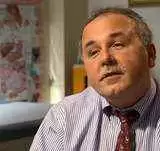Celiac.com 12/26/2007 - Can children with Autism Spectrum Disorder eat their way out of their cocoons?
Eight yearsago I knew little about autism. Fifty years ago I heard that a distantacquaintance of mine had an autistic child. It was extremely unusual at thetime. I needed it explained to me and was told that the child was almost totallyunresponsive.
Celiac.com Sponsor (A12):
Recent statistics show that between one and one and ahalf million people in the USA are afflicted with autism, making it the fastest growing developmentaldisability. There has been a thirteen percent increasein autism since 1990.
The term "autism" wasfirst coined by Eugen Bleuler a Swiss psychiatrist, and the term was also applied to those with adult schizophrenia. Initially parents were blamed andpsychological rejection was cited as a possible cause, but over time a greater understanding evolved and an analysis ofsymptoms and protocols for their treatment developed.
If we examinethe history of dietary intervention for celiac disease, according toElaine Gottschall's Breaking the Vicious Cycle, initially the SpecificCarbohydrate Diet was widely favored . Only later on did thegluten-free casein-free diet begin to eclipse the Specific Carbohydrate Diet for the management of celiac disease, following a smallstudy published in Lancet in the U.K., and the diet gained enormouspopularity which has been maintained to the present. Researcherspublished results of their work with the Open Original Shared Link. Many people with autism noticed improvements once gluten and dairy products were removedfrom their diets. According to some estimates 60% of people with autism experience positiveeffects from the diet, and there are some reports of people recovering completely from Autism Spectrum Disorder. However,there is a subset of children who do not respond to the diet and get stalled orplateau at some point, and these people must often seek other treatment avenues.
Less thanten years ago a few adults reported that the Specific CarbohydrateDiet was fostering encouraging progress in their Autism Spectrum Disorder children.Gottschall believed that in addition to gluten starches and certainsugars were at the root of digestive disorders. A small support group formedwhich followed the Specific Carbohydrate Diet to treat Autism Spectrum Disorder, and this group has grown from a handful to several thousandsince its inception. The majority of its members transitioned from the gluten-free casein-free diet. Some peoplewere told incorrectly that the Specific Carbohydrate Diet is an extension of the gluten-free casein-free diet, or that it is only suitableif the gluten-free diet fails. The protocols about food restrictions andcontamination differ. The Specific Carbohydrate Diet is, however, a unique stand-alone diet.
Althoughchildren with autism who are on the Specific Carbohydrate Diet are in a statistical minority compared to those on the gluten-free casein-free diet, anecdotal reports indicate that their success rate is nearly 80%. It often turns out that some of those who initiallyfail have not followed the diet correctly, and they fare quite well when they start it over and do it correctly. In several small studies the Specific Carbohydrate Diet outperformed the gluten-free casein-free diet in the treatment of autism. Alarge scale formal study could cost up to one million dollars and therefore hasnot been conducted. In the absence of such studies mainstream medicinehas bypassed or dismissed the Specific Carbohydrate Diet as inconclusive, but some doctors have commented that sinceit is a healthy and balanced diet it is worth a try. One concern is thatpeople will abandon their medication, but this idea is not advocated by the support group.
Ibecame interested in the autism-Specific Carbohydrate Diet connection when ElaineGottschall invited my support on the Internet list called "Elaine'sChildren," which was renamed subsequently renamed pecanbread@yahoo.com (Open Original Shared Link). WhenI began to read the stories of improvement, progress in behavior anddigestion, and of some who recovered from Autism Spectrum Disorder, I literally got chills. I began to archive those stories and combined several in a piecewhich I submitted to a parenting magazine. The editors were veryinterested but insisted on having a gluten-free casein-free diet author comment and counter mystory. Since I do not view dietary intervention as a competition thearticle was withdrawn.
I am not sorry. Dietary intervention mustnot be a contest. The diet that WORKS is the diet to choose. Thatchoice may affect the entire future of a young human being and of theirfamily. It is critical for parents to explore, research, connect withothers and become informed so they can select the best option to fittheir needs.
If you want to read more about ElaineGottschall be sure to read "All Her Children" at Pecanbread.com, and decide if this is a diet that could help your family.
Editor's Note: Celiac.com supportsthe idea that the Specific Carbohydrate Diet is gluten-free and can bevery helpful for many people, depending on their situation. Wedisagree, however, with the assertion that Elaine Gottschall makes inher book Breaking the Vicious Cycle that people with celiac disease can be cured by the Specific Carbohydrate Diet after being on it for a certain time period.







Recommended Comments